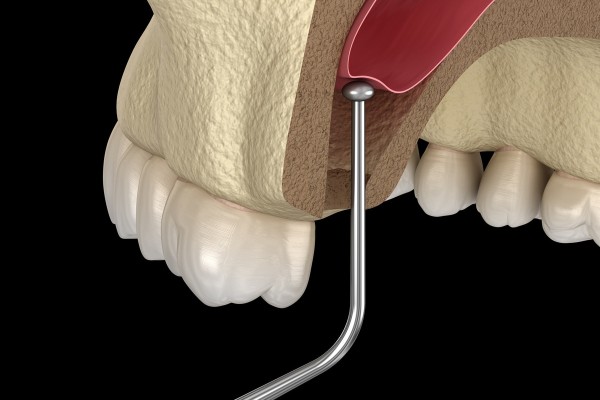One of the most important factors in successful dental implant surgery is having enough bone in place where the implant will be installed. Probably the hardest place to install dental implants is the upper back jaw, because this area typically has less bone quantity and lower bone quality, and is also very close to the sinus. There are a number of reasons why you may have lost bone in the upper back jaw, such as through tooth loss or periodontal disease, and when that happens you may not have enough bone for implants to be installed.
This situation can be corrected by sinus lift surgery, which raises the sinus floor, and helps to develop bone which can be used for placing dental implants. One of the most common techniques used in sinus lift surgery starts off by making an incision to expose existing bone. Then a very small circle would be cut into that bone, and it would be lifted into the sinus cavity.
The space below would be filled with material from a bone graft. In the last step, the incision would be closed, so that the affected area can heal. This process generally requires between four and 12 months prior to the actual dental implant surgery. Sinus lift surgery causes minimal discomfort for most patients, and provides you with the best chance for a successful dental implant in the upper back jaw.
Candidates for Sinus Lift Surgery
The most likely candidates for sinus lift surgery are patients who have an inadequate amount of bone in the upper jaw. That means it will probably not be able to support dental implants without augmentation. Usually after a tooth has been removed, there is a rapid reduction in bone density in that specific area. This would make it either very difficult or impossible for a dentist to install implants. This deficiency is corrected by sinus lift procedure, because additional bone is added into the area, either from your body or from a donor.
Recovering from Sinus Lift Surgery
In the aftermath of sinus lift surgery, you may experience some level of swelling in the area which has been operated on. It’s also possible that you may bleed from the nose or the mouth. There may even be some level of discomfort for several days following surgery, but this doesn’t usually amount to anything major. Patients who continue to experience bleeding or swelling more than a few days after surgery are advised to contact their dentist immediately.
There is a slight risk of sinus infection after surgery, but your dentist will probably provide you with medication that can avoid this. It will be necessary for you to avoid huge sneezes if possible, or blowing your nose very strongly. These kinds of actions can cause the bone graft material to shift in your mouth, or it can cause the stitches to become dislodged.
Patients who have a history of allergies will probably be scheduled for sinus lift surgery during a season where allergies are quiet, so as to avoid complications. Cost of sinus lift is acceptable considering the relief it will bring to the patient. You can expect to have several visits with your dentist during the healing process or sinus lift recovery process, so that the progress of your sinus lift surgery can be monitored.
Emplacement of Your Dental Implants
In most cases, patients would be required to go through a healing period of between four and 12 months before having their dental implants installed. This will provide plenty of time for the new bone material in your mouth to fuse into position. The exact duration of that wait will depend largely on the kind of material which was used to generate new bone.
There are unusual cases where dental implants can be installed directly after sinus lift surgery, with no waiting time at all. While it is generally considered safe to do so, it’s also true that when a patient has less than 4 mm of bone height, the success rate drops. After a thorough consultation with your dentist, you’ll know approximately how long your own waiting time frame will be.
When You Need Dental Implants
If you’re a West Palm Beach, FL resident, or if you live anywhere in the surrounding region, the practice where you should go to have the work done is Good Samaritan Dental Implant Institute, where Dr. Andrew Slavin can provide the absolute best care for you. Dr. Slavin is a 5-star rated oral surgeon who has had years of experience and knowledge in this field, and will ensure that your dental implants are expertly installed.


